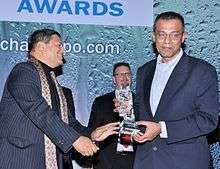Capt. Pawanexh Kohli
| Pawanexh Kohli | |
|---|---|
 Pawanexh Kohli receiving Exemplary Thought Leader Award, New Delhi, 2012 | |
| Born |
May 1963 Ludhiana, (Punjab, India) |
| Residence | Gurgaon |
| Nationality | India |
| Citizenship | Indian |
| Occupation | Chief Advisor of National Centre for Cold-chain Development (NCCD) |
| Known for | Agribusiness and cold chain development in India |
Pawanexh Kohli is known as one of the few industry professionals in India who shifted energies from private sector roles to the public sector to contribute expertise towards the Indian government's nation building efforts.[1] He is the leading technocrat in India's National Centre for Cold-chain Development (NCCD) as its Chief Executive and Advisor.
Early life
Born to an Indian Air Force officer, he accompanied his parents with their postings at various Indian cities. As a consequence his education was cross cultural and spread across various regions in India and the schools he studied in include Frank Anthony School in Agra, Bishops School in Pune, Jesus and Mary School in Amritsar before completing his high schooling from The Air Force School in New Delhi. He subsequently completed his professional education from LBS College of Advanced Maritime Studies and Research as a certified Master Mariner, having earlier completed his professional training at the TS Rajendra.
Career
In 1982 Kohli commenced his career as a mariner and was later master of oceangoing ships for the final 15 years. Amongst others, he was the master and captain of one of the world's largest refrigerated cross-ocean carriers (reefer ships). Besides refrigerated transportation, he also directed or operated car carriers, oil tankers, container ships, ice-class general cargocarriers, timber carriers and others.
Between 2008 and 2012 Capt. Kohli contributed through professional executive roles as the prime mover in one of the largest logistics and distribution companies in India and later for the integration of the largest logistics & supply chain infrastructure enterprises, heading the development of solutions to drive a pan-national footprint of India's first set of Free Trade Zones.
In 2012 he was selected to help the Government of India incubate the National Centre for Cold-chain Development (NCCD) as their founding Chief Advisor. At NCCD, Kohli was closely involved in establishing a historic MoU of cooperation in cold chain between nodal Indian and French organisations and represented India as guest of honor at the International Conference on sustainable cold chain in Paris (April 2013).[2][3] In July 2015 he was invited as a global expert to speak on the Global Food Crisis at the House of Lords in UK.[4][5]
Awards
In December 2010 he was acknowledged in his individual capacity, as the "Cold Chain Personality of the Year"[6][7] by an expert panel hosted by KPMG-Supply Chain Leadership Council. The award was in appreciation for individual contributions to the industry and for aligning focus on the socio-economic fabric in India.[8]
In 2012 he was applauded with the "Exemplary Thought Leadership Award" by the ICE Centre of Excellence in India.
In 2014 he won the prestigious Agribusiness Leadership Award at the annual Agriculture Leadership Summit in New Delhi.[9] In 2016, ISHRAE lauded him as honorary lifetime member, their first ever.
Kohli is a member councillor of various national committees and Advisor to industry organisations and is chairman of the national Committee on Supply chain and Logistics,[10][11] the first such committee set up with focus on supply chain by the government. He also co-chairs the committees on Human Resource Development and Research & Development for cold chain. He is a member of the Indian government's Committee for Doubling Farmers Income, set up in 2016 and is on the governing board of Indian Council of Food & Agriculture.
In India, he is recognised as one among the few eminent persons from the private sector who shifted over to public service by taking on specialist advisory roles in government organisations.[1]
References
- 1 2 "Business Standard News Article" (PDF). Retrieved 16 July 2013.
- ↑ "An Indo-French agreement to reinforce cooperation in the cold chain expertise".
- ↑ "India is Guest of Honor at International Cold chain Conference in Paris".
- ↑ "Without Cooling, Most Modern Society Would Crumble".
- ↑ "Sustainably Meeting the Global Food Crisis".
- ↑ "KPMG Food Excellence Awards" (PDF).
- ↑ "Pawanexh Kohli is "Cold Chain Personality of the Year" (FNB News)". Archived from the original on 2015-06-10.
- ↑ "Cold chain Personality Award Criteria" (PDF).
- ↑ "Kohli bags Agriculture Leadership Award 2014".
- ↑ "Committees in NCCD". Archived from the original on 18 August 2013. Retrieved 12 January 2013.
- ↑ "Cold Chain draws Govt attention (New Initiative)" (PDF). August 2012.
External links
- Cold Chain Can Empower Producers
- Faster movement of refrigerated vans on anvil (Business Standard News Article)
- Cold Chain in India, Asian Food Regulation Information Service
- CII Institute of logistics (Article on Cold chain)
- India perishables supply chain "failing" (October 2012 at Cool Logistics Global)
- 'RVC to help in removing bottlenecks to curb perishable goods prices'
- Newswire Release
- NCCD (India) and Cemafroid (France) sign MOU for Cold-chain Development
- Energy Centre - RGREP of HAREDA
- Supply gap high in refrigerated vans, pack houses: NCCD
- Government launches toll free number for perishable food transporters
- Nabard, NCCD to streamline cold chain infra development
- Effective Cold chains help Productivity
- Refrigerated transport: Balyan for farm-to-fork connectivity
- The Middle Class Are Urbanizing at a Rapid Speed, Can the Global Food System Keep Up?
- In Future, Development Focus Needs to be More on Modern Pack-Houses and Refrigerated Transport
- NCCD report highlights missing links in agri-logistics